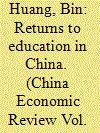| Srl | Item |
| 1 |
ID:
183803


|
|
|
|
|
| Summary/Abstract |
China announced the development of a more equitable and higher efficiency education on 5 March 2021. The expenditure on compulsory education in China over the past three decades has been greatly improved through a series of adjustments to educational policy. In this article, we divide these policies broadly into three phases corresponding to respective policy goals and priorities of government work during specific times. We focus primarily on the adequacy, efficiency, and equity in education finance and review the literature on the effectiveness of the various policies from these three perspectives. Although the priority of the government work has been shifted from revenue collection to expenditure assurance, it is observed that the urban-rural and regional disparities in educational spending have made little progress over time. The equity issue around groups of students with different educational needs is less emphasized by policies or in the literature because of the challenge of tracking and measuring educational inputs and outputs at the student level in China. This challenge is also one of many that hinders research on the efficiency of compulsory education finance. We conclude with a discussion of some implications for future research.
|
|
|
|
|
|
|
|
|
|
|
|
|
|
|
|
| 2 |
ID:
156454


|
|
|
|
|
| Summary/Abstract |
Using longitudinal Chinese county-level data from 2005 to 2007, we examine the causal effect of the Province-Managing-County fiscal reform on primary education spending by combining propensity score matching with the difference-in-difference method and allowing for the concurrent County Strengthening and Power Expansion reform. While the fiscal reform significantly increases per pupil expenditure on elementary education, there is little evidence showing that this fiscal reform narrows the urban-rural expenditure gap within counties. This Province-Managing-County reform, on the other hand, aggravates regional educational spending disparity in elementary schools based on the observation that the reform has caused a higher increase of per pupil educational spending in the affluent Eastern Region than the increase in Central and West China.
|
|
|
|
|
|
|
|
|
|
|
|
|
|
|
|
| 3 |
ID:
187880


|
|
|
|
|
| Summary/Abstract |
China experienced a near 5-fold increase in annual Higher Education (HE) enrolment in the decade starting in 1999. Using the China Household Finance Survey, we show that the Great HE Expansion has exacerbated a large pre-existing urban-rural gap in educational attainment underpinned by the hukou (household registration) system. We instrument the years of schooling with the interaction between urban hukou status during childhood and the timing of the expansion – in essence a difference-in-differences estimator using rural students to control for common time trends. We find that the Great HE raised earnings by 17% for men and 12% for women respectively, allowing for county fixed-effects. These Two Stage Least Squares (2SLS) estimates, which are robust to additional controls for hukou status at birth fully interacted with birth hukou province, can be interpreted as the Local Average Treatment Effect (LATE) of education on earnings for urban students who enrolled in HE only because of the Great HE Expansion. For the selected subsample of respondents with parental education information, we find that the 2SLS returns for students from more disadvantaged backgrounds are at least as high as their more advantaged counterparts, for both genders.
|
|
|
|
|
|
|
|
|
|
|
|
|
|
|
|